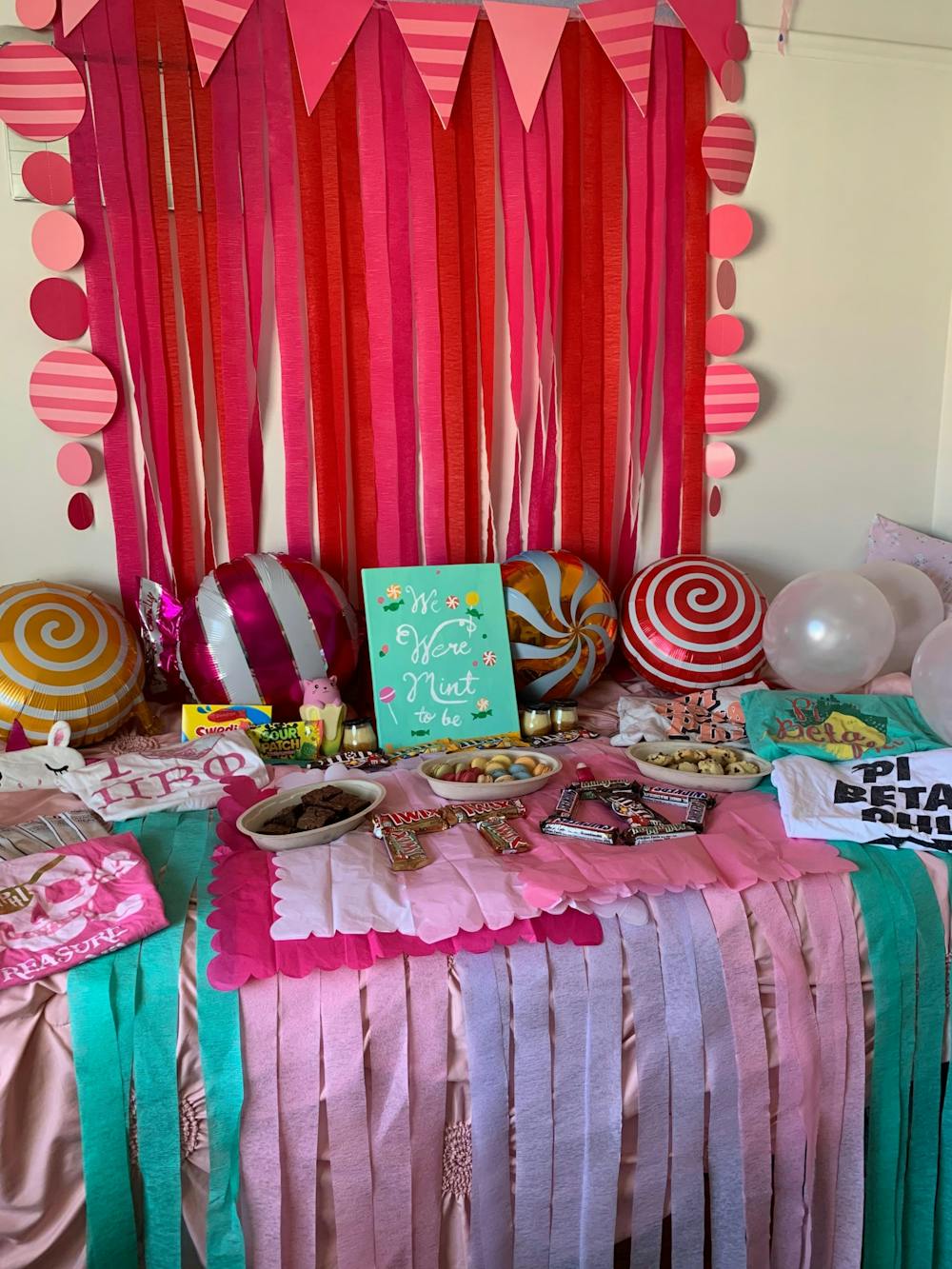
The University’s panhellenic sororities have an annual tradition of pairing their newest members, “littles,” with a mentor, known as a “big.” Once paired, the big meticulously plans a “secret week” of surprises for the little, leading up to their exciting reveal at the end of the week.
Every big wants to give their little the most outstanding secret week extravaganza ever! This often translates into a sizable impact for both the big and the environment. To a certain extent, secret week is commercialized and perpetuated by our consumption-based economy. As a result, a successful secret week often equates to one that is grand, bold and expensive.
Displays of affection are often shown in the form of brand new tangible goods. This sort of mentality is clearly shown during secret week, with the subtle competition between bigs trying to out-decorate each other and seemingly ‘buying’ their little’s affection. Buying new things might seem necessary to show that you care, but you can accomplish this by just being there for your little.
Don’t get us wrong, we appreciated every part of our own secret weeks. But we didn’t know, or even care, if the decorations our bigs used were secondhand or brand new. A heartfelt letter can mean so much more than a room filled to the brim with balloons. What we remembered most are the notes our bigs left us and the portraits they drew of us, not the streamers that hung from our doors and the canvases covering our bed. We just cared that our bigs took time out of their day to do something special for us.
We feel like we’re not alone in this thinking, yet here we all are still spending exuberant amounts of money on decorations that’ll be thrown away that day. So why not choose to go the sustainable route? It’ll make your little, wallet and the planet happy.
For people used to elaborate secret weeks, you might be skeptical of changing some of your traditions and habits, maybe afraid of skimping out. But we have to consider the waste that every sorority’s secret week produces. Say every big in a sorority gives their little around 20 balloons during secret week (and that’s on the very, very low side), and on average there are about 35 littles per sorority. That’s 700 balloons per week for one sorority, so the total for all five sororities is 3,500 balloons. Let that sink in. Thirty-five hundred balloons. These will not be reused. In fact, no balloon is truly environmentally-friendly. They will be popped and thrown away, taking about four years to decompose. These balloons will still be sitting in a landfill after your little graduates.
If you’re still not buying into the whole environmental impact of it all, think about your wallet. Personally, we don’t like spending money, so we kept all the decorations our bigs gave us to use for our littles so we wouldn’t have to buy it later. We saved it in boxes under our beds for a year. We kept every shirt, every canvas, every inch of ribbon. This year, we had almost all of our decorations ready without having to buy brand new decor, saving hundreds of dollars and reducing our footprints as well.
We’ve researched a few ways to make our little’s secret week great for her and the planet. Some ideas are far more elaborate than others, requiring talent, time and money. To save you some time, here are some of the simpler ways to convert an otherwise wasteful secret week into a sustainable, equally meaningful and possibly even cheaper one. We challenge you to pick something to pursue, whether it is to not use a single balloon or to thrift every piece of clothing or to make a craft instead of buying it new.
Instead of using plastic decorations that you will inevitably find in your little’s trash can the next day, think about making your own. We decided to make our own confetti by using colorful scrap paper from other crafts and punched holes. Consider using biodegradable glitter if you can afford it. We also have a Pinterest board filled with paper crafts and decorations. It’s a creative outlet, is significantly cheaper and can be recycled.
As for clothing, keep everything that your big gave you and look into buying secondhand. If you want original designs that your chapter hasn’t done before, look into Poshmark. We found many unique shirts, all under $20. Most of your sisters will sell and trade shirts for much cheaper if you’re trying to ball on a budget. Another way your sisters can help you is by lending your art supplies. Don’t throw away any of the paints and brushes and leftover canvases either. Give them another life by donating or selling them. If you don’t like a particular design, consider restoring or repainting the canvas.
Another thing we cannot ignore are single-use items that have extensive packaging or create waste. Food comes in an enormous amount of packaging. Every big we know, including ourselves, purchases snacks for their little. But we encourage you to make food from scratch to skip some of the packaging. Put it in plastic containers instead of plastic bags. Buy a reusable mug to put their coffee delivery in (two presents in one!). Now think back to the balloons that take years to decompose. Maybe try ditching them all together or drastically cut down their use. If you stick to similar color schemes, you can save time and reuse balloons on other days of the week.
One more tip: Keep it local and keep it small. When you inevitably have to buy something new, instead of resorting to large corporations like Amazon, Michaels or Party City, buy from small, sustainable sellers on Etsy or consignment shops nearby. Need some recommendations? Check out cool stores in Hampden and Charles Village like In Watermelon Sugar, Get Shredded Vintage and Changed My Mind. Supporting local businesses is a crucial element of sustainable living and can add a unique and personal touch to her day.
As for everything else, encourage your little to keep as much as she can, especially the things you had to buy that were brand new. It’s less expensive for her next year and less taxing on the environment. If you see decorations in her trash can, don’t be afraid to take it out (if it’s not gross) and keep it for her for next year. She’ll thank you for it later.
If you’re not used to living a sustainable lifestyle, making these changes can be difficult and sound nearly impossible. They can seem more expensive and time-consuming, and sometimes they are. We won’t lie and say that there isn’t some ingrained privilege involved. For this reason, we’re not asking you to ditch everything you had planned and to make every item compostable and zero-waste. We just want you to make one small change and encourage others to follow suit.
The opinions in this article do not reflect the views of Pi Beta Phi Fraternity.





